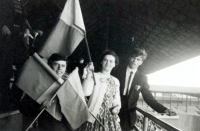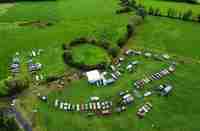
Reporting for TV on the state of the nation at that point in our history wasn’t much fun. There were huge issues for people who lost their jobs when the construction sector was hit badly. Thousands of families were struggling to meet mortgage commitments, due mainly to the over-inflated prices of houses in the boom days. The country was struggling through one of its most testing periods ever.
I thought a lot about the difficult nature of the news coverage in that era over the last 18 months as the Covid-19 pandemic turned our little country upside down again. Once again there were tears and tragedies. There were quite a few similarities too.
It has been such a catastrophic era in the country’s history. I have crystal-clear recollections of when Covid-19 really hit home here. I was in Ballyleague (on the quayside) in the middle of a fairly lively community development project meeting – blissfully unaware of the real seriousness of the virus – and totally ignorant of the repercussions which would cripple us as a nation again.
Deputy Denis Naughten was among the group. When the meeting started his mind was really thousands of miles away. Denis arrived with his mobile phone clenched in his fist, and immediately told us that the Taoiseach was expected to come out of the Irish Embassy in Washington at any minute – where he was on a pre-St. Patrick’s Day visit – and make a live TV broadcast on the escalation of an unfolding crisis to everyone at home.
I remember myself and the rest of the people present still being far from properly focused on the seriousness of what was coming. Instead, we were listening tentatively to the civil servant from a government department in Ballina who had driven over to update us in person on our Access for All disability project. Our focus was on efforts to acquire a major grant to help complete the building of a new centre on the quayside to compliment our brand new wheelchair boat, then just about to land in Ireland. The proceedings were brought to a thundering halt when Denis Naughten hushed us (quite rightly) and clicked onto the LIVE TV feed from the RTE News phone app so we could all see and hear the broadcast. When Leo Varadkar spoke, it turned out to be the most devastating few minutes of the day – and quickly made our meeting fairly irrelevant.
I can still remember the instant reaction when the Taoiseach finished. The country was effectively to be closed down. The mobile phones of practically everybody began to sound out. Within minutes every single one of our visitors were gone – summonsed immediately to their offices to try and deal with the instant consequences of the decision just announced. Lockdown.
Eventually, the often traumatic TV coverage of Covid-19 became one of the reasons why I decided to leave a job I loved and had happily carried out for 27 years. I have been asked the question so many times in the last couple of months that the answer has now been abbreviated into the most basic of explanations. ‘Why did you pack it in?’ most people enquire. In response, I simply say there was not one but several good reasons – but the fall-out from daily Covid-19 coverage was very near the top. The day I went into the office of Jon Williams, the head of news and current affairs in RTE, I had simplified it even more: “There are only so many times I can stand outside nursing homes around the country where people have died without finding that the experience is now impacting on myself as well as the bereaved”, I told my boss. I was witnessing endless grief for the families of victims night after night in the midlands. Often, I had to report on the deaths of 12 people, 14 people, 16 people in separate care homes. Repeatedly, I was talking of the grief of their loved ones – most of whom were not even allowed to enter the buildings where the deaths took place, and many of whom to this day are still awaiting an explanation into the exact circumstances as to how their Dad or Mum or grandfather or grandmother actually died, or whether he or she could have been saved.
It was a truly horrific period in my career in journalism. My daily conversations with relatives of the deceased were often agonising. I was receiving emails and calls with claims and counter claims about individual incidents. I came to a decision that this was a desperate situation, with no end in sight, one that was even beginning to impact on my own mental health.
The negativity of Covid-19 coverage was beginning to control my life. I wanted to change that personally. In many respects, I had the easiest task of all and I also felt a bit like a coward as I left – walking away from relatives and families still in deep grief and asking questions that were eliciting very few answers.
On RTE radio recently with Marty Morrissey, I expressed my opinion that a national public inquiry will eventually be held to try and answer questions for relatives in cases where they cannot find closure available. Like everyone else, I know that the care provided to the elderly and vulnerable was outstanding in hundreds of nursing homes around the country. I have been back to those homes in Laois and Offaly again recently to speak to weary staff who battled hard for months to keep the virus out, but there are thousands of people out there who still believe that the outcomes might have been very different if national policies had themselves been very different at the beginning. They are still searching for answers. Let’s hope they can get closure when this process is all over.
Another main reason why I left my job in RTE was my desire to return to my own part of the country so that I could concentrate in the next phase of my life on my ongoing work in community development and social enterprise. It was an obvious transition. For decades I have been up to my neck in community voluntary work. Tireless volunteers like Jimmy Hudson, Gerry Trimble and Margaret Thompson in Ballyleague know the sweat and tears that were often necessary. They know too the enjoyment we all took from literally hundreds of local development meetings and thousands of form-filling days when we eventually worked together as a community and delivered projects such as the beautiful promenade in Ballyleague.
Community development is slow, cumbersome and often frustrating work, but also hugely rewarding. I can visualise another hard-working community volunteer Gerry Thompson and local stalwarts Detta Cox, Anna Egan, Marie Burke and Mary Greally trying to gather up yellow plastic ducks and fire them into the River Shannon at the bridge in Ballyleague for a fundraising race event years ago.
The truth is that I very much loved the final outcomes of those projects. I was prouder than anyone to see the thousands of people walk, cycle and run down our promenade. Such was the kick I was getting, I decided (over time) if the day ever came when I could work full-time on similar projects in the community or in the social inclusion area, I would seize the opportunity with both hands. Thanks to Roscommon LEADER Partnership, that chance came early this year when a position was advertised. It helped me make up my mind even more quickly on the career choice in front of me.
In the meantime – over a three-year period – I had prepared for the full-time transition away from broadcasting and taken time out of my weekends to study for a BA Honours Degree in social enterprise and community work. It is more than gratifying to see so many of these fine graduates in key roles around the county now.
When the ‘final day’ came on June 28th, leaving RTE News was highly emotionally charged for me and my family. I found myself returning to Lough Funshinagh, chatting Mary and Padraig Beattie and the people of Rahara to tell the story to the nation of some progress being made in one of the longest running flooding sagas to have affected any community in the country.
I walked away from the role on TV and radio with much pride over what has been achieved over more than a quarter of a century. I look back on stories that exposed medical misdiagnosis, financial irregularities, political expediency and crime that needed to be reported on at the highest level, stories which often led to huge improvements in the way people were treated.
Here in Roscommon, I still reflect on some of the remarkable and moving stories that I covered over the last three decades. I think of devastating fires, tragedies and job losses where the lives of people were changed forever, but my heart also lifts when recalling the heroes – the people I met who had stories of resilience, personal success and great pride after surviving Covid-19, winning All-Ireland medals, or just overcoming diversity in their own life or family.
Now I move to ‘the back benches’ in journalism and public life, where I will work closely with local communities to try and improve the quality of lives again post-Covid. I also look forward immensely to my new weekly column here in the Roscommon People where I will write about the new life around me. Bring it on!






